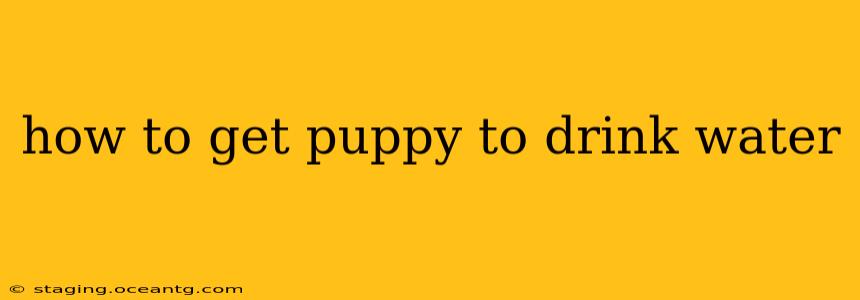Getting your puppy to drink enough water is crucial for their health and well-being. Dehydration can quickly become a serious problem for young dogs, leading to various health complications. This guide explores various reasons why your puppy might not be drinking enough water and offers practical solutions to encourage proper hydration.
Why Isn't My Puppy Drinking Enough Water?
Several factors can contribute to a puppy's reluctance to drink sufficient water. Understanding these underlying causes is the first step towards solving the problem.
Is my puppy sick?
One of the most important considerations is whether your puppy is unwell. Illness, especially gastrointestinal issues like vomiting or diarrhea, can significantly reduce a puppy's thirst. If your puppy shows other signs of illness – lethargy, loss of appetite, unusual bowel movements – consult your veterinarian immediately. Dehydration can worsen existing conditions, so prompt veterinary attention is essential.
What kind of water bowl is being used?
The type of water bowl can surprisingly impact a puppy's drinking habits. Some puppies dislike the feel of metal bowls, preferring ceramic or plastic alternatives. Others may find deep bowls difficult to navigate, leading to frustration and avoidance. Experiment with different bowl materials, sizes, and shapes to find what suits your puppy best. Consider a shallow, wide bowl to make drinking easier.
Where is the water bowl located?
Puppies may avoid drinking from bowls placed in high-traffic areas or near loud noises. Choose a quiet, easily accessible location away from food and litter boxes. Ensure the area is clean and comfortable to encourage your puppy to approach the bowl freely.
Is the water fresh and clean?
Just like humans, puppies are less likely to drink stagnant or dirty water. Regularly clean and refill your puppy's water bowl with fresh, cool water throughout the day. Consider using a filtered water source if tap water has a strong odor or taste.
How much water should my puppy be drinking?
The amount of water your puppy needs depends on factors like their breed, size, age, activity level, and diet. As a general rule, puppies typically need access to water at all times. Consult your veterinarian to determine the appropriate water intake for your individual puppy. They can help you assess whether your puppy is drinking enough or experiencing dehydration.
How to Encourage Your Puppy to Drink More Water
Once you've identified any potential underlying issues, here are several strategies to encourage your puppy to drink more water:
Offer different types of water?
While plain water is best, you can try adding a small amount of low-sodium broth (chicken or beef, ensuring no added onions or garlic) to entice your puppy. Avoid adding anything else without consulting your vet first as some ingredients can be harmful to dogs.
Add ice cubes?
Many puppies enjoy the playful aspect of ice cubes. Adding a few ice cubes to their water bowl can make drinking more engaging and may encourage them to lap up more water. Especially on hotter days, chilled water can be very appealing.
Use multiple water bowls?
Placing water bowls in different areas of your home can make it easier for your puppy to access water throughout the day.
Monitor your puppy closely?
Pay attention to your puppy's behavior and drinking habits. If you notice any significant changes or concerns, don't hesitate to contact your veterinarian. Early intervention is key when dealing with potential dehydration issues.
When to See a Vet
If your puppy is showing signs of dehydration (sunken eyes, dry gums, lethargy), or if you are struggling to get them to drink water despite trying these tips, it’s vital to seek professional veterinary advice immediately. Dehydration can quickly escalate into a serious health problem.
This comprehensive guide offers practical advice on how to encourage your puppy to drink water. Remember, consistent observation, a proactive approach, and seeking veterinary care when needed are essential for maintaining your puppy's health and well-being.
